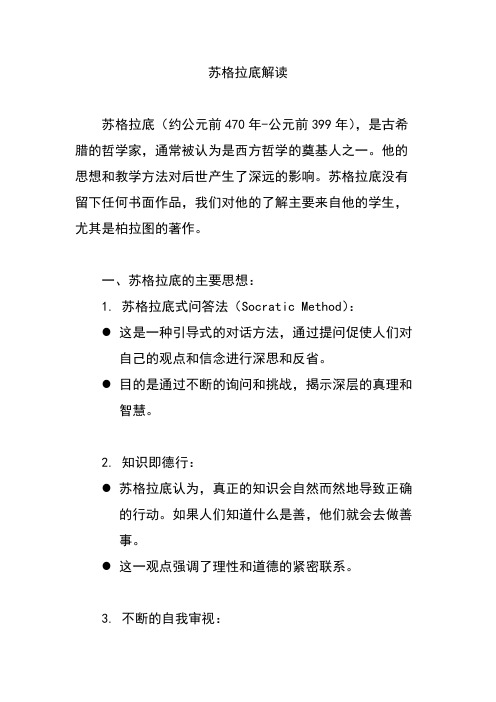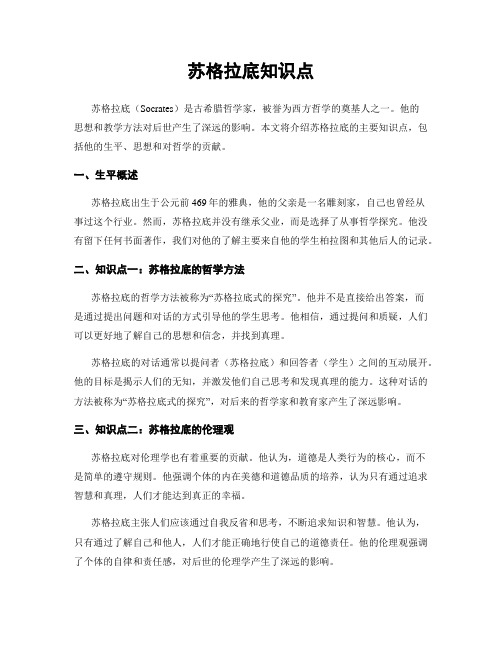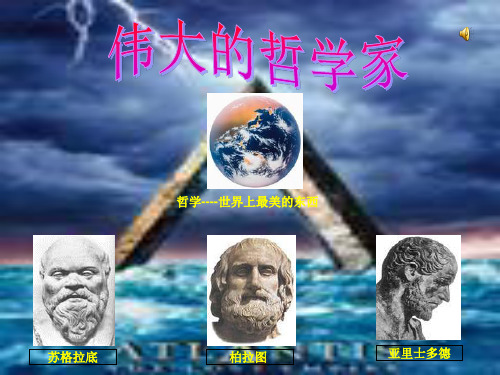苏格拉底
苏格拉底

苏格拉底求助编辑百科名片苏格拉底塑像苏格拉底(Σωκρ?τη?);英译:Socrates;公元前469—公元前399),著名的古希腊的思想家、哲学家,教育家,他和他的学生柏拉图,以及柏拉图的学生亚里士多德被并称为“古希腊三贤”,更被后人广泛认为是西方哲学的奠基者。
另有同名巴西足球运动员和葡萄牙总理。
个人履历苏格拉底出生于希腊雅典一个普通公民的家庭。
其父是雕刻匠,母亲是助产妇。
苏格拉底生就扁平的鼻子,肥厚的嘴唇,凸出的眼睛,笨拙而矮小的身体。
他容貌平凡,语言朴实,却具有神圣的思想。
他出生在希波战争取得完全胜利的时刻,成长在伯里克利的盛世,当时正值智者从全希腊各地云集雅典,给民主制度雅典带来了许多新知和自由论辩的新风尚的时期。
年轻的苏格拉底曾向著名的智者普罗泰哥拉和普罗第柯等人求教,讨论各种重要的社会人事和哲学的问题。
又曾从女智者狄俄蒂玛受业。
自称有“灵迹”伴随,预示以何事不当为,终身信奉。
亦受奥尔斐秘教及毕达哥拉斯派的影响。
苏格拉底一生过着艰苦的生活。
无论严寒酷暑,他都穿着一件普通的单衣,经常不穿鞋,对吃饭也不讲究。
但他似乎没有注意到这些,只是专心致志地做学问。
生平事例,成就思想,均由其弟子记录。
青少年时代,苏格拉底曾跟父亲学过雕刻手艺。
后来他熟读荷马史诗及其他著名诗人的作品,靠自学成了一名很有学问的人。
他以传授知识为生,30多岁时做了一名不取报酬也不设馆的社会道德教师。
苏格拉底把自己看作神赐给雅典人的一个礼物、一个使者,任务就是整天到处找人谈话,讨论问题,探求对人自己最有用的真理和智慧。
因此他的一生大部分是在室外度过的,喜欢在市场、运动场、街头等公众场合与各方面的人谈论各种各样的问题,例如,什么是虔诚?什么是民主?什么是美德什么是勇气?什么是真理?以及你的工作是什么?你有什么知识和技能?你是不是政治家?如果是,关于统治你学会了什么?你是不是教师?在教育无知的人之前你怎样征服自己的无知?等等。
贯穿这些讨论的主题就是引导人们认识:在这些对于人至关重要的问题上,其实人是非常无知的,因此人们需要通过批判的研讨去寻求什么是真正的正义和善,达到改造灵魂和拯救城邦的目的。
苏格拉底相关介绍

苏格拉底教学生也从不给他们现成的答案, 苏格拉底教学生也从不给他们现成的答案,而是用反问和反驳的方 法使学生在不知不觉中接受他的思想影响。 法使学生在不知不觉中接受他的思想影响。请看一个他和学生问答 的有趣的例子。 的有趣的例子。 学生:苏格拉底,请问什么是善行? 学生:苏格拉底,请问什么是善行? 苏格拉底:盗窃、欺骗、把人当奴隶贩卖, 苏格拉底:盗窃、欺骗、把人当奴隶贩卖,这几种行为是善行还是 恶行? 恶行? 学生:是恶行。 学生:是恶行。 苏格拉底:欺骗敌人是恶行吗?把俘虏来的敌人卖作奴隶是恶行吗? 苏格拉底:欺骗敌人是恶行吗?把俘虏来的敌人卖作奴隶是恶行吗? 学生:这是善行。不过,我说的是朋友而不是敌人。苏格拉底: 学生:这是善行。不过,我说的是朋友而不是敌人。苏格拉底:照 你说,盗窃对朋友是恶行。但是,如果朋友要自杀, 你说,盗窃对朋友是恶行。但是,如果朋友要自杀,你盗窃了他准 备用来自杀的工具,这是恶行吗?学生:是善行。 备用来自杀的工具,这是恶行吗?学生:是善行。 苏格拉底:你说对朋友行骗是恶行,可是,在战争中, 苏格拉底:你说对朋友行骗是恶行,可是,在战争中,军队的统帅 为了鼓舞士气,对士兵说,援军就要到了。但实际上并无援军, 为了鼓舞士气,对士兵说,援军就要到了。但实际上并无援军,这 种欺骗是恶行吗? 种欺骗是恶行吗? 学生:这是善行。 学生:这是善行。
一、生平简介
苏格拉底:(约公元前469~公元前 苏格拉底:(约公元前 :(约公元前 ~公元前399年)古希 年 腊唯心主义哲学家、教育家。 腊唯心主义哲学家、教育家。他出生于雅典一个普通公 民的家庭,父亲是石匠和雕刻匠,母亲是助产婆。 民的家庭,父亲是石匠和雕刻匠,母亲是助产婆。青少 年时代,苏格拉底曾跟父亲学过手艺, 年时代,苏格拉底曾跟父亲学过手艺,熟读荷马史诗及 其他著名诗人的作品,靠自学成了一名很有学问的人。 其他著名诗人的作品,靠自学成了一名很有学问的人。 他喜欢在市场、运动场、街头等公众场合与各方面的人 他喜欢在市场、运动场、 谈论各种各样的问题,如战争、政治、友谊、艺术, 谈论各种各样的问题,如战争、政治、友谊、艺术,伦 理道德等等。他曾三次参战,当过重装步兵, 理道德等等。他曾三次参战,当过重装步兵,不止一次 在战斗中救助受了伤的士兵。 岁左右 岁左右, 在战斗中救助受了伤的士兵。40岁左右,他成了雅典的 远近闻名的人物。苏格拉底一生过着艰苦的生活。 远近闻名的人物。苏格拉底一生过着艰苦的生活。无论 严寒酷署,他都穿着一件普通的单衣,经常不穿鞋,对 严寒酷署,他都穿着一件普通的单衣,经常不穿鞋, 吃饭也不讲究。但他似乎没有注意到这些, 吃饭也不讲究。但他似乎没有注意到这些,只是专心致 志地做学问。 志地做学问。
苏格拉底的解读

Part 1 苏格拉底的生平简介
目
Part 2 苏格拉底的独特思想录Part 3 对苏 Nhomakorabea拉底“牛虻
之说”的解读
1 苏格拉底的生平简介
(1)苏格拉底(∑ωκράτης,英译: Socrates; 公元前469年—公元前399年) (2)苏格拉底是著名的古希腊哲学家和教 育家,他和他的学生柏拉图及柏拉图的学 生亚里士多德被并称为“希腊三贤” (3)主张让有知识的人来治理国家他强调 “美德即知识”“知识的对象是善”,知识 是可教的但并不是从外面灌输给人的,而是 人的心灵先天就有的,把人的先天就有的,潜 在的知识和美德诱发出来,这就是教育 (4)首先发明和使用了与师生共同谈话,共 商问题以获得知识为特征的问答式教育法 (5)苏格拉底本人没有写过什么著作,他 的行为和学说,主要是通过他的学生柏拉 图和克塞诺芬尼著作中的记载流传下来的。 哲学史家往往把他作为古希腊哲学发展史 的分水岭,将他之前的哲学称为前苏格拉 底哲学。 (6)苏格拉底被后人广泛认为是西方哲学 的奠基者。
3 对苏格拉底“牛虻之说”的解读
对“牛虻之说”的解读
②苏格拉底还说: “我是一只牛虻……这个国家好比一匹硕大的骏马, 可是由于太大,需要一只牛虻叮叮它,使它的精神焕 发起来。” 苏格拉底认为国家“由于太大,需要一只牛虻叮叮它, 使它的精神焕发起来”,这表现了苏格拉底的爱国情 怀,并非追求个人自由。也说明了苏格拉底在关注国 家的弊端,希望通过自己的尽职尽责,为国家的发展 做出贡献。表达了苏格拉底的批判精神和社会责任。
3 对苏格拉底“牛虻之说”的解读
╔
对“牛虻”一词的解释
“牛虻”一词源于希腊神话,天后赫拉嫉妒丈夫宙
斯爱上了少女安娥,放出牛虻来日夜追逐已化为牛的安
苏格拉底解读

苏格拉底解读苏格拉底(约公元前470年-公元前399年),是古希腊的哲学家,通常被认为是西方哲学的奠基人之一。
他的思想和教学方法对后世产生了深远的影响。
苏格拉底没有留下任何书面作品,我们对他的了解主要来自他的学生,尤其是柏拉图的著作。
一、苏格拉底的主要思想:1. 苏格拉底式问答法(Socratic Method):●这是一种引导式的对话方法,通过提问促使人们对自己的观点和信念进行深思和反省。
●目的是通过不断的询问和挑战,揭示深层的真理和智慧。
2. 知识即德行:●苏格拉底认为,真正的知识会自然而然地导致正确的行动。
如果人们知道什么是善,他们就会去做善事。
●这一观点强调了理性和道德的紧密联系。
3. 不断的自我审视:●他的名言“未经审视的生活不值得过”,强调了自我反省的重要性。
●通过不断地审视和质疑自己的信念和价值观,人可以达到更高的精神和道德水平。
4. 普遍定义的追求:●苏格拉底试图找到诸如“正义”、“勇气”、“善”等概念的普遍定义。
●这种对普遍性真理的追求,为后来的哲学思想打下了基础。
二、苏格拉底的影响:1.对西方哲学的影响:苏格拉底对西方哲学的发展产生了深远的影响,特别是通过他的学生柏拉图和柏拉图的学生亚里士多德。
2.道德哲学的奠基人:他的思想在伦理学和道德哲学领域具有重要地位。
3.教育方法的先驱:苏格拉底式问答法至今仍被视为一种有效的教学和辩论方法。
苏格拉底的生活和死亡(他因不敬神灵和腐蚀雅典青年的罪名而被判处死刑)也成为了他哲学思想的一部分,体现了他对真理和道德的坚持。
他的生平和思想在柏拉图的《阿波罗吉亚》等作品中有着详细的记录和表现。
苏格拉底

西方哲学苏格拉底(前469年—前399年)著名的古希腊哲学家。
出生于伯里克利统治的雅典黄金时期,死于雅典的败落时期。
苏格拉底是一位个性鲜明,被人褒贬不一而充满传奇色彩的历史人物。
他一生未曾著述,其言论和思想多见于柏拉图和色诺芬的著作如《苏格拉底言行回忆录》。
苏格拉底重视伦理学,是古希腊第一个提出要用理性和思维去寻找普遍道德的人,他是道德哲学的创始人,他强调道德是由理性指导的,所以“美德就是知识”,认为善出于知,恶出于无知。
在欧洲哲学史上最早提出唯心主义的目的论,认为一切都是神所创造与安排的,体现了神的智慧与目的。
提出了“自知自己无知”的命题,认为只有放弃对自然界的求索(因为那时神的领域),承认自己无知的人才是聪明人. (名言名句)人可以犯错,但是不可犯同一个错。
柏拉图(约前427年-前347年),古希腊伟大的哲学家,他一生著述颇丰,其教学思想主要集中在《理想国》(又译作《国家篇》)和《法律篇》中。
柏拉图是西方客观唯心主义的创始人柏拉图认为世界由“理念世界”和“现象世界”所组成。
理念的世界是真实的存在,永恒不变,而人类感官所接触到的这个现实的世界,只不过是理念世界的微弱的影子,它由现象所组成,而每种现象是因时空等因素而表现出暂时变动等特征。
其哲学体系博大精深,对其教学思想影响尤甚.(名言名句) 真理永远在少数人一边。
亚里士多德(前384—前322年),古希腊斯吉塔拉人,是世界古代史上最伟大的哲学家、科学家和教育家之一。
他一生勤奋治学,从事的学术研究涉及到逻辑学、修辞学、物理学、生物学、教育学、心理学、政治学、经济学、美学等,写下了大量的著作,他的著作是古代的百科全书,据说有四百到一千部,主要有《工具论》、《形而上学》、《物理学》、《伦理学》、《政治学》、《诗学》等。
他的思想对人类产生了深远的影响。
他创立了形式逻辑学,丰富和发展了哲学的各个分支学科,对科学作出了巨大的贡献。
弗朗西斯·培根(1561-1626),英国文艺复兴时期最重要的散作家、哲学家。
苏格拉底知识点

苏格拉底知识点苏格拉底(Socrates)是古希腊哲学家,被誉为西方哲学的奠基人之一。
他的思想和教学方法对后世产生了深远的影响。
本文将介绍苏格拉底的主要知识点,包括他的生平、思想和对哲学的贡献。
一、生平概述苏格拉底出生于公元前469年的雅典,他的父亲是一名雕刻家,自己也曾经从事过这个行业。
然而,苏格拉底并没有继承父业,而是选择了从事哲学探究。
他没有留下任何书面著作,我们对他的了解主要来自他的学生柏拉图和其他后人的记录。
二、知识点一:苏格拉底的哲学方法苏格拉底的哲学方法被称为“苏格拉底式的探究”。
他并不是直接给出答案,而是通过提出问题和对话的方式引导他的学生思考。
他相信,通过提问和质疑,人们可以更好地了解自己的思想和信念,并找到真理。
苏格拉底的对话通常以提问者(苏格拉底)和回答者(学生)之间的互动展开。
他的目标是揭示人们的无知,并激发他们自己思考和发现真理的能力。
这种对话的方法被称为“苏格拉底式的探究”,对后来的哲学家和教育家产生了深远影响。
三、知识点二:苏格拉底的伦理观苏格拉底对伦理学也有着重要的贡献。
他认为,道德是人类行为的核心,而不是简单的遵守规则。
他强调个体的内在美德和道德品质的培养,认为只有通过追求智慧和真理,人们才能达到真正的幸福。
苏格拉底主张人们应该通过自我反省和思考,不断追求知识和智慧。
他认为,只有通过了解自己和他人,人们才能正确地行使自己的道德责任。
他的伦理观强调了个体的自律和责任感,对后世的伦理学产生了深远的影响。
四、知识点三:苏格拉底的死亡苏格拉底的思想和教学方法引起了当时雅典政府的不满。
他被指控煽动青年学生对政府的不满,并否认雅典神灵的存在。
最终,苏格拉底被判处死刑,并选择了自己喝下毒饮。
苏格拉底的死亡成为了他思想的象征,他坚守真理和自己的信念,甘愿接受死亡。
他的死亡也引起了人们对言论自由和思想自由的思考,对后世的哲学家和政治家产生了深远的影响。
五、知识点四:苏格拉底的影响苏格拉底的思想和教学方法对后世产生了深远的影响。
【PPT】苏格拉底解读

泛认为是西方哲学的奠基者。
民主等罪名被判处死刑。他拒绝了
朋友和学生要他乞求赦免和外出逃
亡的建议,饮鸩而死。在欧洲文化
史上,他一直被看作是为追求真理
而死的圣人,几乎与孔子在中国历
史上所占的地位相同。多年来他被
认为是反民主的、维护反动的奴隶
主贵族利益的哲学家,近来已有人
对此提出了不同看法。
贡献、影响:
•
• 贡献、影响:亚里士多德对世界的贡献之大,令人震惊。他
至少撰写了170种著作,其中流传下来的有47种。当然,仅以数字 衡量是远远不够的,更为重要的是他渊博的学识令人折服。他的科 学著作,在那个年代简直就是一本百科全书,内容涉及天文学、动 物学、胚胎学、地理学、地质学、物理学、解剖学、生理学,总之, 涉及古希腊人已知和各个学科。他的著作包含三个方面:一是前人 的知识积累,二是助手们为他所作的调查与发现,三是他自己独立 的见解。
一个颠倒看世界的古代哲学家—— 柏拉图
• 生平.事迹:柏拉图自幼好
学,曾学习作诗,也写过悲剧。
据说,在希腊诗歌集中,就有柏
拉图写的诗歌。体育学校结业后,
他到骑兵部队服过兵役,还参加
• 简介:柏拉图(公元前
427年—前347年)的原名 是亚里士多克勒斯,后来 体育学校的老师看到他的
过三次战斗。在他20岁的时候, 父亲把他带到苏格拉底那里从教。 在这之前,他曾学习过赫拉克利 特和巴门尼德的哲学。他还创建 了西方世界第一个正规的学校--柏拉图学园。柏拉图一生中非常
•
亚里士多德的著作所表述的观点是,人类生活及社会的每个方
面,都是思考与分析的客体;宇宙万物不被神、机会和幻术所控制,
而是遵循着一定的规律运行;人类对自然界进行系统而深入的研究
苏格拉底的故事

苏格拉底是古希腊哲学家,他的故事有很多,以下是一些关于他的著名故事:
1.苹果的故事:据说有一天,苏格拉底在街上行走时,看到一个人
很不开心。
他问那个人为什么不开心,那个人回答说他没有钱买苹果。
苏格拉底听后,从口袋里掏出一枚硬币,递给那个人,说:“现在你有了钱,可以去买苹果了。
”那个人拿到硬币后,非常高兴地离开了。
苏格拉底的学生问他为什么要这样做,苏格拉底回答说:“我并没有真正给那个人钱,我只是让他意识到他已经拥有了买苹果的钱。
”这个故事告诉我们,快乐并不在于拥有多少财富,而在于我们对生活的态度。
2.求知的故事:苏格拉底曾经说过:“我只知道一件事,那就是我什
么都不知道。
”这句话表达了他对知识的谦虚态度。
他认为,真正的智慧在于认识到自己的无知,并不断追求知识。
苏格拉底经常与人们进行对话,通过提问和辩论来启发人们思考,帮助他们发现真理。
3.死亡的故事:苏格拉底在被判处死刑后,他的学生们都非常伤心。
然而,苏格拉底却非常平静,他告诉学生们,死亡并不是一件坏事,而是人生的必然。
他说:“死亡是人生的终点,但也是另一个生命的开始。
”这个故事表达了苏格拉底对生命和死亡的深刻理解。
- 1、下载文档前请自行甄别文档内容的完整性,平台不提供额外的编辑、内容补充、找答案等附加服务。
- 2、"仅部分预览"的文档,不可在线预览部分如存在完整性等问题,可反馈申请退款(可完整预览的文档不适用该条件!)。
- 3、如文档侵犯您的权益,请联系客服反馈,我们会尽快为您处理(人工客服工作时间:9:00-18:30)。
The giant Socrates and his thought of lifeAbstractSocrates is the incarnation of wisdom , he is one of the three ancient Greek saints, although it is a simple thing he often explain that for people in a profound light. Socrates is the navigation lamp for stray mind, pointing them in the right direction. Socrates is the burning torches, lighting up the people's consciousness. In the European history, Socrates has always been regarded as the saint pursuiting of truth and conviction, in the end he also sacrified for his blief. The later generation respect him in a high status just as the Confucius in Chinese history, so he was called western Confucius. Socrates has made a profound and lasting influence on various aspects of western society, such as philosophy and politics. In this paper, i will make a brief introduction of Socrates and his thoughts,also included my inspiration after having a further understanding about him.Key words: Socratic method Philosophical Beliefs Virtue Pursue Cherish HappinessThe introduction of SocratesSocrates (born c. 470, Athens — died 399 BC, Athens) is the ancient Greek thinker who laid the early foundations for Western philosophical thought. His "Socratic Method" involved asking probing questions in a give-and-take which would eventually lead to the truth. Socrates was born in Athens and fought as a foot soldier in the Peloponnesian War with Sparta, but in later years became a devotee of philosophy and argument. He spent years in the public places of Athens, engaging his fellow citizens in philosophical discussions and urging them to greater self-analysis. Socrates's iconoclastic attitude didn't sit well with everyone, and at age 70 he was charged with heresy and corruption of local youth. Convicted, he carried out the death sentence by drinking hemlock, becoming one of history's earliest martyrs of conscience. Socrates's most famous pupil was Plato, who in turn instructed the philosopher Aristotle.Greek philosopher whose way of life, character, and thought exerted a profound influence on ancient and modern philosophy. Because he wrote nothing, information about his personality and doctrine is derived chiefly from depictions of his conversations and other information in the dialogues of Plato, in the Memorabilia of Xenophon, and in various writings of Aristotle. He fought bravely in the Peloponnesian War and later served in the Athenian boule . Socrates considered it his religious duty to call his fellow citizens to the examined life by engaging them in philosophical conversation. His contribution to these exchanges typically consisted of a series of probing questions that cumulatively revealed his interlocutor's complete ignorance of the subject under discussion; such cross-examination used as a pedagogical technique has been called the "Socratic method." Though Socrates characteristically professed his own ignorance regarding many of the ethical subjects he investigated , he did hold certain convictions with confidence, including that: (1) human wisdom begins with the recognition of one's own ignorance; (2) the unexamined life is not worth living; (3) ethical virtue is the only thing that matters; and (4) a good person can never be harmed, because whatever misfortune he may suffer, his virtue will remain intact. His students and admirers included, in addition to Plato, Alcibiades, who betrayed Athens in the Peloponnesian War, and Critias (c. 480 – 403 BC), who was one of the Thirty Tyrants imposed on Athens after its defeat by Sparta. Because he was connected with these two men, but also because his habit of exposing the ignorance of his fellow citizens had made him widely hated and feared, Socrates was tried on charges of impiety and corrupting the youth and condemned to death by poisoning in 399 BC; he submitted to the sentence willingly. Plato's Apology purports to be the speech that Socrates gave in his own defense. As depicted in the Apology, Socrates' trial and death raise vital questions about the nature of democracy, the value of free speech, and the potential conflict between moral and religious obligation and the laws of the state.The compassion to happinessSocrates believed the best way for people to live was to focus on self-development rather than the pursuit of material wealth.He always invited others to try to concentrate more on friendships and a sense of true community, for Socrates felt this was the best way for people to grow together as a populace. His actions lived up to this: in the end, Socrates accepted his death sentence when most thought he would simply leave Athens, as he felt he could not run away from or go against the will of his community; as mentioned above, his reputation for valor on the battlefield was without reproach.The idea that humans possessed certain virtues formed a common thread in Socrates' teachings. These virtues represented the most important qualities for a person to have, foremost of which were the philosophical or intellectual virtues. Socrates stressed that "virtue was the most valuable of all possessions; the ideal life was spent in search of the Good. Truth lies beneath the shadows of existence, and it is the job of the philosopher to show the rest how little they really know.There is a famous story reflected Socrates' attitude about life. One day, he led a few disciples came to af wheat field . That's what mature season, the earth is full of heavy grain. Socrates said to his disciples: "you go to the wheat field to pick one of the biggest grain, you should go straight but not retreat into the field. I'm waitting for you at the fronter of the wheat field." His students got the requests, came into the field in succession. The earth is full of big grain, but which one is the biggest? His disciples walked forward, looked at this, shook his head; then seeked another one and shook his head too. They always hold theview that the biggest grain is still in front,s, so the disciples were not satisfied about the grain in their hands, then throwed it away. They always think there are too many opportunitys, it was not necessary to make a decision in such a hurry. Disciples straighted ahead, and picked seriously . A long period of time passed by.Suddenly, they heard a loud voice: "you have got the frontier." Then the disciples with empty hands had recongised that they have no chance. Socrates said to his disciples: "It is definite that the biggest wheat exised in this field, but you may not be able to run into it; even confronted, is unlikely to make the accurate judgment. Because the biggest is the one you just took off."The short story told us that life is just like the seeking journey in the wheat field,we always aimed to search the biggest and most satisfied one,but when we meet it,some people could grasp the good chance immediately, the majority hesitated and look around for a better grain, at last, they got nothing but a couple of empty hands and a sign. Our destiny offers not the cup of despair, but the chalice of opportunity. So let us seize it, not in fear, but in gladness.There is no certain affirm definition about the best, but the one suit you and in your hands is the most content grain. Smart is the highest realm wisdom, wisdom is the highest realm of love. Socrates' soul does not belong to the philosophy, but also belongs to all mankind happiness. Because he opened a road into a free and unfettered life for human.Life is just like walking across the wheat field, there is only one opportunity no one can walk back, if you want to grasp the biggest grain,you must pay great courage and efforts the most important of appreciating the beauty in our dull daily life.Socrates' outward appearance is grotesque:shout and not tall,with prominent eyes, snub nose, broad nostrils and wide mouse,but he is all glorious within. Therefore the size of your body is of little account, the size of your brain is of much account, the size of your heart is of the most account of all. A person have a wisdom heart, whether in which situation he can find a road to happiness. In my perspective, the definition of happiness is the capacity for enjoyment. The more we can enjoy what we have, the happier we are.it's easy to overlook the pleasure we get from loving and being loved, the company of friends, the freedom to live with good health. while happiness may be more complex for us, the solution is the same as ever. Happiness isn't about what will happen to us, it's the knack of finding a positive for every negative, and viewing a setback as a challenge. It's not wishing for what we do not have, but enjoy what we do possess. If you weeped for the missing sunset,you would miss all the shining stars. Remember what should be remembered, and forget what should be forgotten. Alter what is changeable, and accept what is immutable and have a gratitude mind, you will lead to a more meaningfull life.Happiness lies not in the mere possession of money; it lies in the joy of cherishing what you have possessied.。
